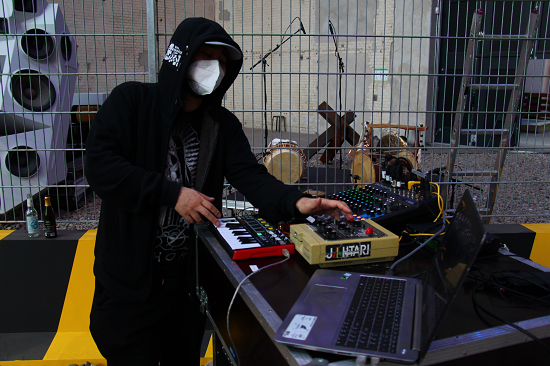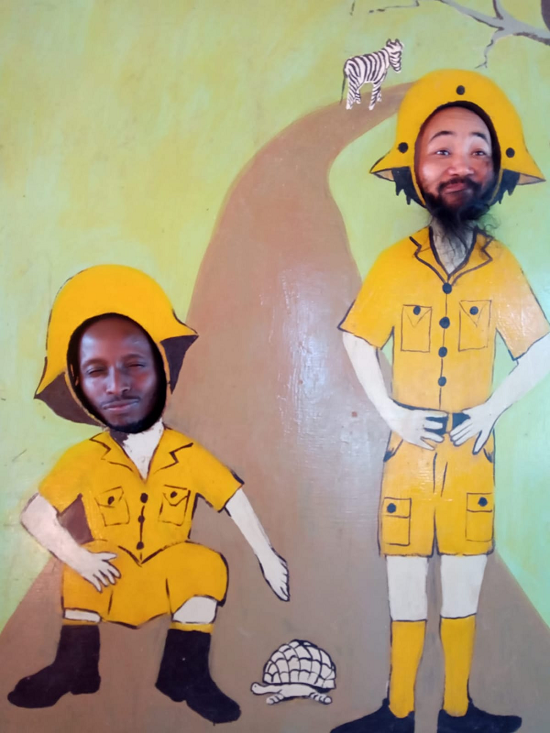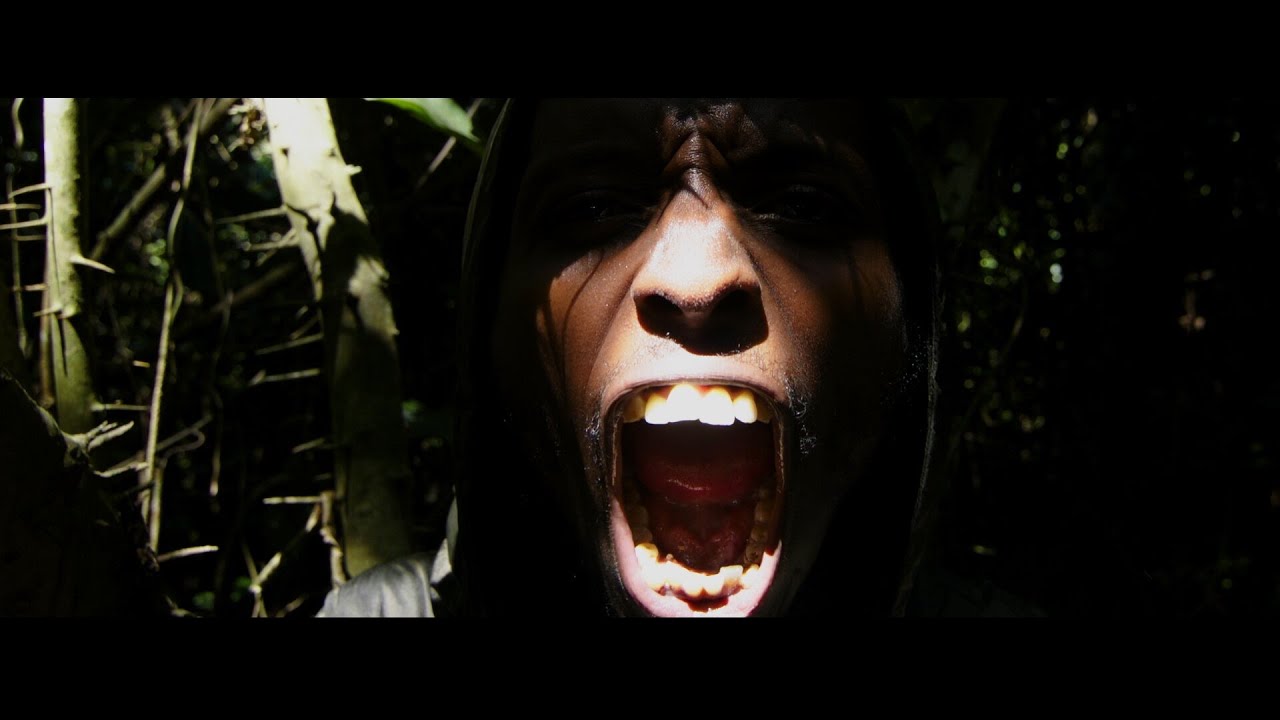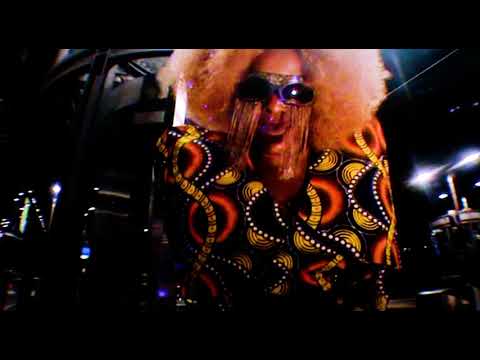Martin Khanja, aka Lord Spikeheart, and Shigeru Ishihara, aka DJ Scotch Egg
When Shigeru Ishihara, aka DJ Scotch Egg, went to Uganda in 2019 for a two month residency at the Nyege Nyege villa – the artists’ HQ and recording studio on the outskirts of Uganda operated by the label of the same name – he went with few expectations. He had been given an open-ended brief: to collaborate with local musicians and see what they could come up with. The label’s co-founder, Belgian expat Arlen Dilsizian, was keen for it to “not be too obvious,” Ishihara explains. “Not just like, ‘Western culture’s perspective of African music,’ something a bit different. That was quite important.” To round off the trip he would also give a performance at that year’s edition of Nyege Nyege Festival. Other than that, the trip was his to interpret as he pleased.
Ishihara was already aware of East Africa’s extraordinary experimental music scene, much of which has been brought to wider audiences over the last few years via Nyege Nyege and its club-focussed sister label Hakuna Kulala. Of particular interest to the producer was singeli music – frenetic, hyper-intense loops and beats coupled with energetic, socially-conscious young MCs – that has long been popular in inner-city Dar Es Salaam, Tanzania; Nyege Nyege’s Sounds Of Sisso compilation of the genre in 2017 remains one of the label’s most acclaimed releases. “This really fast music, it reminded me of back in the day in Brighton with my crew Wrong Music.” He drew parallels between singeli’s intense BPMs and uncompromising punk spirit, and the manic gabba, chiptune, noise and speedcore he and artists like Ladyscraper and Shitmat were producing on England’s south coast in the noughties. Dilsizan had also shown him Nihiloxica, the intoxicant Anglo-Ugandan electro-percussion outfit whose first tapes were released on Nyege Nyege. “They’re amazing,” Ishihara says. “But I didn’t know exactly what [the residency] was going to be at all. No one told me anything.”
One of the first people Ishihara met at the villa was Martin Khanja, also known as Lord Spikeheart, one half of the intense Kenyan grindcore duo Duma. He remembers his “pure, no bullshit, organic vibe.” Khanja took him out to eat in Kampala where the two hit it off. “He had a really good education about underground music,” Ishihara remembers. “He liked noise rock from Japan like Boredoms. I was like, ‘You know that? That’s crazy!’” Later, Duma were performing at ONE54, the Kampala club where they were running a regular metal night. “They were looking for a bassist and they said ‘Shige, I know you play bass!’” He stepped up and was blown away by their live presence as they played together. “It was raw energy, the sound of Khanja shouting was really tight. I was like ‘wow, this guy’s really talented.’”
Once settled, with the villa’s recording studio at his disposal, Ishihara established a routine. As well as teaching basic Japanese for fun to the other artists in the villa, and to local children while they hassled him for sweets, from midday until 5pm he’d work with percussionists, then in the evening he’d be joined by one of many different African vocalists with whom “I’d record until I passed out.” Khanja was one of them. “I’ve always wanted to incorporate grindcore into electronic music,” Ishihara continues. So too was Ugandan underground hip hop mainstay MC Yallah and the multi-faceted vocalist Swordman Kitala. The prodigiously talented 20-year-old producer DJ Chrisman also joined him for some sessions, as did the villa’s studio manager Don Zilla, himself a producer of considerable ability .
Don Zilla remembers their first meeting well; it was clear from the off that something special was brewing. “It was if I had met a brother from another mother,” he tells tQ. “I took him to the lake to show him around and to show him some brotherly love and let him feel at home. We talked a lot about life, and we shared a lot of experiences until he told me that I should write a book because it might change a lot people’s lives. And boom… right in that moment a collaboration spirit possessed us and we sketched out plans of working together.”
All five of the guests on Tewari, as well as Ishihara himself, are uncompromising artists, yet in very different ways; Lord Spikeheart’s sprawling screams, MC Yallah’s punchy staccato bars, and Swordman Kitala’s ferocious dancehall flow all mine the same depths of intensity, albeit through different routes. The album that came out of their sessions, Tewari, is a record that embraces that shared penchant for extremity. On ‘Omuzira’ and ‘Juice’ Ishihara creates a thick, heavy, but somehow spacious beat that’s tailor-made for Yallah’s terse flow, and on ‘Nfulula Biswa’ provides Swordman Kitala with a pummelling, industrial dub track redolent of Kevin Martin at his finest. It’s the three tracks with Lord Spikeheart that are most uncompromising of all – Ishihura’s fiery beats merging with Khanja’s merciless grindcore screams to create something so oppressive and claustrophobic that it becomes thrilling, like a headrush after being starved of oxygen.
The only way the musicians could communicate with one another verbally was in English, a second or third language for them all, yet there were few barriers when it came to creative cohesion. When living in close quarters with other artists over the course of two months “you connect with them spiritually,” Ishihara explains. Recording sessions were navigated “mainly [by] the feeling of the sound. Like sometimes I’d be the main guy with a laptop, people would come into the studio and we’d made music from nothing by just feeling the moment. Then they might get excited and start writing lyrics. They sing in different African languages, Swahili mixed with English, or sometimes Ugandan traditional [languages], and they’ll try and explain to me what it means. Often they’re quite positive, they all make dark music, but positive too. Like light in the darkness.” Before long, all the musicians were playfully addressing each other by the title ‘sensei’. One evening, a group of them made a trip to the only Japanese restaurant in Kampala. “I was in heaven,” Ishihara beams.
The collaborative spirit is apparent on Ishihara’s tracks with Don Zilla and Chrisman too, the former adding intense psychedelic percussion and the latter twisting the music’s experimental edges on the largely instrumental tracks they produced. It’s even to be found on the three Tewari songs he produced entirely solo. The glitchy ‘U.T.B. 88’, for example, which incorporates distorted drumming not dissimilar to Nihiloxica, was essentially tailor-written for another show at the ONE54. “I wanted to capture the vibe there, I wanted to make people dance, to make them crazy too. To make music they could dance to, but from my perspective.”

Photo by Yuko Asanuma
“My experience working with Scotch Rolex was amazing,” MC Yallah tells tQ. “He was so free with me that he allowed me to express myself in a way that I could put any ideas I had with his together and come with something from the beat itself. And [he was] so funny. Our work was full of humour.” Don Zilla is even more effusive. “My experience with Shige was so magical,” he says. “Shige is wonderful positive brother whom I respect so deeply, and all I can say is it was a pleasure working with him and having shared his precious time with me and the rest of the members, it is not something to take for granted. I’m honoured and humbled to be part of his album.”
It’s this attitude, an inclusive and high-spirited one, that gives Tewari the coherence that makes it a great album, rather than a collection of interesting collaborations. For all its heaviness, its stylistic diversity, and the way Ishihara shapes individual instrumentals to suit that track’s particular collaborator, the entire thing is shot through with a unifying sense of playful exploration. Fun has always been a big part of DJ Scotch Egg’s work, whether it be the manic visuals for his early Wrong Music single ‘Scotch Chicken’, in which he fights a giant chicken, or the 50-strong orchestra made up entirely of people playing Game Boys he established in the mid-2000s, and it’s a spirit that defined the Uganda sessions too. Even the decision to release the album under the name Scotch Rolex – rolex being the name of a Ugandan street food consisting of an omelette and vegetables wrapped in a chapati – was the product of a running joke with Nyege Nyege’s Derek Debru; Ishihara insists he was unaware it was going to be the official name until he saw it in print.
So too does Tewari represent the continuation of a consistent collaborative spirit. Whether it be his woozy electronica project WaqWaq Kingdom, with King Midas Sound’s Kiki Hitomi, his time playing bass for experimental noise-rockers Seefeel, or his joint EP with Gooooose he recorded in China shortly before the outbreak of coronavirus (incidentally, he and Gooooose met at Nyege Nyge Festival, and for the EP incorporated an unused Swordman Kitala session he recorded at the villa), Ishihara is a people person. “I love working with people, I love sharing ideas, because I learn a lot in this way,” he says, shortly before inviting me to hang out in Berlin once the pandemic’s over. “If I make music with people in the same room, or some inspirations they have or share, or snding a youtube link or whatever, you always learn something new. Playing with people on a stage is nice too. Alone I get nervous.”
It’s fitting that Ishihara’s time in Uganda ended with two climactic gigs at Nyege Nyege Festival. The first saw him performing live electronics with traditional percussionists, dancers and fire performers, and the second saw him joined by Swordman, Lord Spikeheart and MC Yallah. “I wasn’t sure if [the audience] would like it at first,” he says, “but the beautiful thing about Nyege Nyege Festival is that no one criticises what music you’re playing. They just feel the vibration, and if they like it, they move.”
Tewari is out now via Hakuna Kulala. You can purchase it here




